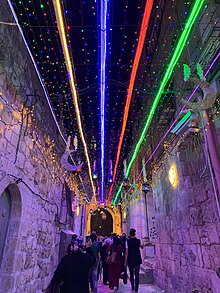Religion in Israel
Religion plays a central role in national and civil life, and almost all Israeli citizens are automatically registered as members of the state's 14 official religious communities, which exercise control over several matters of personal status, especially marriage.[4] While Jewish Israelis are all technically under the jurisdiction of the state Orthodox rabbinate,[5] personal attitudes vary immensely, from extreme Orthodoxy to irreligion and atheism.The poll also found that 50% of the respondents would give up shopping on the Sabbath as long as public transportation were kept running and leisure activities continued to be permitted; however, only 38% believed that such a compromise would reduce the tensions between the secular and religious communities.Haredi applies to a populace that can be roughly divided into three separate groups, except mentioned Hardal, along both ethnic and ideological lines: (1) "Lithuanian/Lita'im" Haredim of Ashkenazic (i. e., "Germanic" — European) origin, predominantly, adherents of non-Hasidic traditional Orthodoxy, a.k.a.[42] Under this agreement, which still operates in most respects today:[25] Nevertheless, some breaches of the status quo have become prevalent, such as several suburban malls remaining open during the Sabbath.The Ministry of Education manages the secular and Orthodox school networks of various faiths in parallel, with a limited degree of independence and a common core curriculum.In recent years, perceived frustration with the status quo among the secular population has strengthened parties such as Shinui, which advocate separation of religion and state, without much success so far.[25] Signs of the first challenge to the status quo came in 1977, with the fall of the Labor government that had been in power since independence, and the formation of a right-wing coalition under Menachem Begin.Furthermore, Begin needed the Haredi members of the Knesset (Israel's unicameral parliament) to form his coalition, and offered more power and benefits to their community than what they had been accustomed to receiving, including a lifting of the numerical limit on military exemptions for those engaged in full-time Torah study.They challenged Orthodox control of personal affairs such as marriage and divorce, resented the lack of entertainment and transportation options on the Jewish Sabbath (then the country's only day of rest), and questioned whether the burden of military service was being shared equitably,[25] since the 400 scholars who originally benefited from the exemption, had grown to 50,000.No one was happy with the "status quo"; the Orthodox used their newfound political force to attempt to extend religious control, and the non-Orthodox sought to reduce or even eliminate it.He believed that the work of secular Jews toward creating an eventual Jewish state in Eretz Yisrael was part of a divine plan for the settlement of the land of Israel.The return to Israel was in Kook's view not merely a political phenomenon to save Jews from persecution, but an event of extraordinary historical and theological significance.[citation needed] Prior to the 1917 British conquest of Palestine, the Ottomans had recognized the leading rabbis of the Old Yishuv as the official leaders of the small Jewish community that for many centuries consisted mostly of the devoutly Orthodox Jews from Eastern Europe as well as those from the Levant who had made aliyah to the Holy Land, primarily for religious reasons.The Turks viewed the local rabbis of Palestine as extensions of their own Orthodox Hakham Bashis ("[Turkish] Chief Rabbi/s") who were loyal to the Sultan.[citation needed]Based in its central offices at Heichal Shlomo in Jerusalem the Israeli Chief rabbinate has continued to wield exclusive control over all the Jewish religious aspects of the secular state of Israel.[citation needed] Through a national network of Batei Din ("religious courts"), each headed only by approved Orthodox Av Beit Din judges, as well as a network of "Religious Councils" that are part of each municipality, the Israeli Chief Rabbinate retains exclusive control and has the final say in the state about virtually all matters pertaining to conversion to Judaism, the Kosher certification of foods, the status of Jewish marriages and divorces, and monitoring and acting when called upon to supervise the observance of some laws relating to Shabbat observance, Passover (particularly when issues concerning the sale or ownership of Chametz come up), the observance of the Sabbatical year and the Jubilee year in the agricultural sphere.[citation needed] The Israel Defense Forces also relies on the Chief Rabbinate's approval for its own Jewish chaplains who are exclusively Orthodox.[citation needed] Ten churches are officially recognized under Israel's confessional system, which provides for the self-regulation of status issues, such as marriage and divorce.After capturing the Old City of Jerusalem in 1967, Israel found itself in control of Mount Moriah, which was the site of both Jewish temples and Islam's third holiest site, after those in Mecca and Medina in Saudi Arabia: The Haram al Sharif (Temple Mount) from which Muslims believe that Mohammad ascended to Heaven.The Hashemites thus became the official guardians of the Islamic holy places of Jerusalem and the areas around it, particularly strong when Jordan controlled the West Bank (1948–1967).[92] The Baháʼí Faith has its administrative and spiritual centre in Haifa on land it has owned since Bahá'u'lláh's imprisonment in Acre in the early 1870s by the Ottoman Empire.[94] Several newspapers in Israel since then have noted the presence of Baháʼís in the Haifa area of some 6-700 volunteers with no salaries, getting only living allowances and housing,[95][96] and that if an Israeli citizen were to wish to convert they would be told that "the religion does not seek or accept converts in the State of Israel"[96][97] and that if they persist it is a personal matter between them and God and not a matter of joining a community of believers.The land currently occupied by the Church of the Holy Sepulchre is considered one of the top candidates for Golgotha and thus has been a Christian pilgrimage site for the past two thousand years.Haredi Israeli males devote their young adulthood to full-time Talmudic studies and therefore generally get exemptions from military service in the Israel Defense Forces.Conservative and Reform Jews have been prohibited from holding services at the Western Wall on the grounds that they violate Orthodox norms regarding participation of women.[111] In a ruling of January 2011, the Israeli High Court of Justice stated the unlawfulness of gender segregation and abolished the "mehadrin" public buses.However, the court rule allowed the continuation of the gender segregation in public buses on a strictly voluntary basis for a one-year experimental period.[120] In January 2023, with the rise of the political far-right and religious Zionist parties, emboldened Jewish extremists took to vandalizing Christian grave sites.[121] Currently, Israel issues marriage licenses if performed under an official religious authority (whether it be Orthodox Jewish, Christian, Muslim, Druze, etc.)
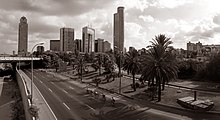
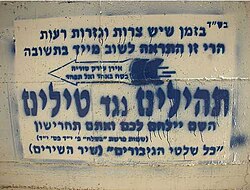



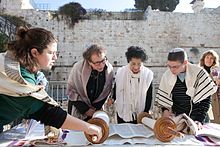
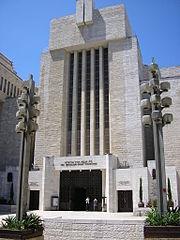

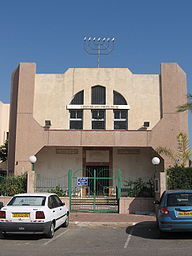


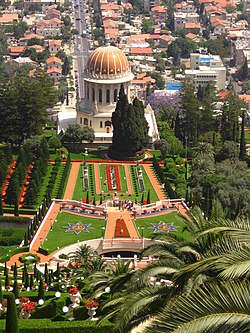

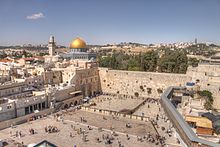
JudaismHiloniMasortiHarediChristianityethnic religionJewish peopleState of IsraelJewish and democratic stateJewish stateMelkiteOrthodoxDruze peopleIsraeli citizensmarriageOrthodox JudaismChief RabbinateCatholic ChurchLatin ChurchArmenian Catholic ChurchMaronite ChurchMelkite Greek Catholic ChurchSyriac Catholic ChurchChaldean Catholic ChurchSyriac Orthodox ChurchArmenian Apostolic ChurchAnglicanismBaháʼí FaithMuslimChristianSamaritanismJewish Israelisirreligion and atheismsecularreligious zionistIsraeli lawfreedom to practicePew Research CenterJewish religious movementsMoroccan JewishLaw of ReturnPassover sederReform JudaismConservative JudaismIsraeli JewsArab IsraelisMasortimShomer MasoretAyalon HighwayTel AvivYom KippurIsraeli Democracy InstituteSabbathIsrael Democracy Institutereligious movementsspiritualitybaal teshuvayeshivasAish HaTorahReligious ZionismHardalPsalmsHebrewFirst Gulf WarIraqi rocket attacks on IsraelHaredi JudaismAsael LubotzkyModern OrthodoxHaredi JewsLithuanian/Lita'imAshkenazicMisnagdimHasidicEastern EuropeanSephardi HaredimmizrahiWoW Torah ReadingJerusalemAnat HoffmanConservativeReformIsrael Movement for Reform and Progressive JudaismReconstructionistHumanistic JudaismInternational Institute for Secular Humanistic JudaismStatus quo (Israel)status quoDavid Ben-GurionAgudat IsraelkashrutShabbatJewish burialpublic transportkosherwhite meatSupreme Courtcontrary to the lawwho is a JewMinistry of EducationShinuiMenachem BeginChief Rabbinate of IsraelGreat SynagogueBritish Mandate of PalestineAbraham Isaac KookAshkenaziChief RabbiJacob MeirSephardiEretz Yisraelland of IsraelWestern WallOld YishuvEastern EuropeLevantaliyahEdah HaChareidisHakham Bashisestablished in 1948Batei DinAv Beit Dinconversion to JudaismKosher certification of foodsJewish marriages and divorcesPassoverChametz
